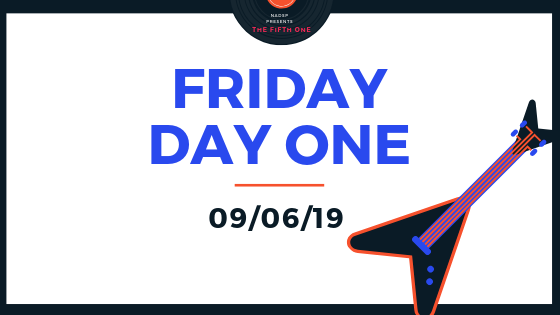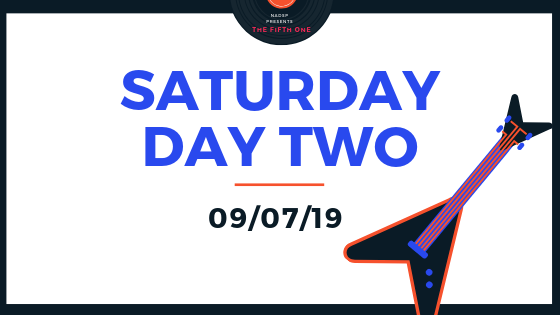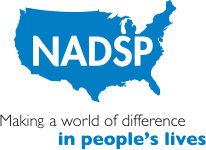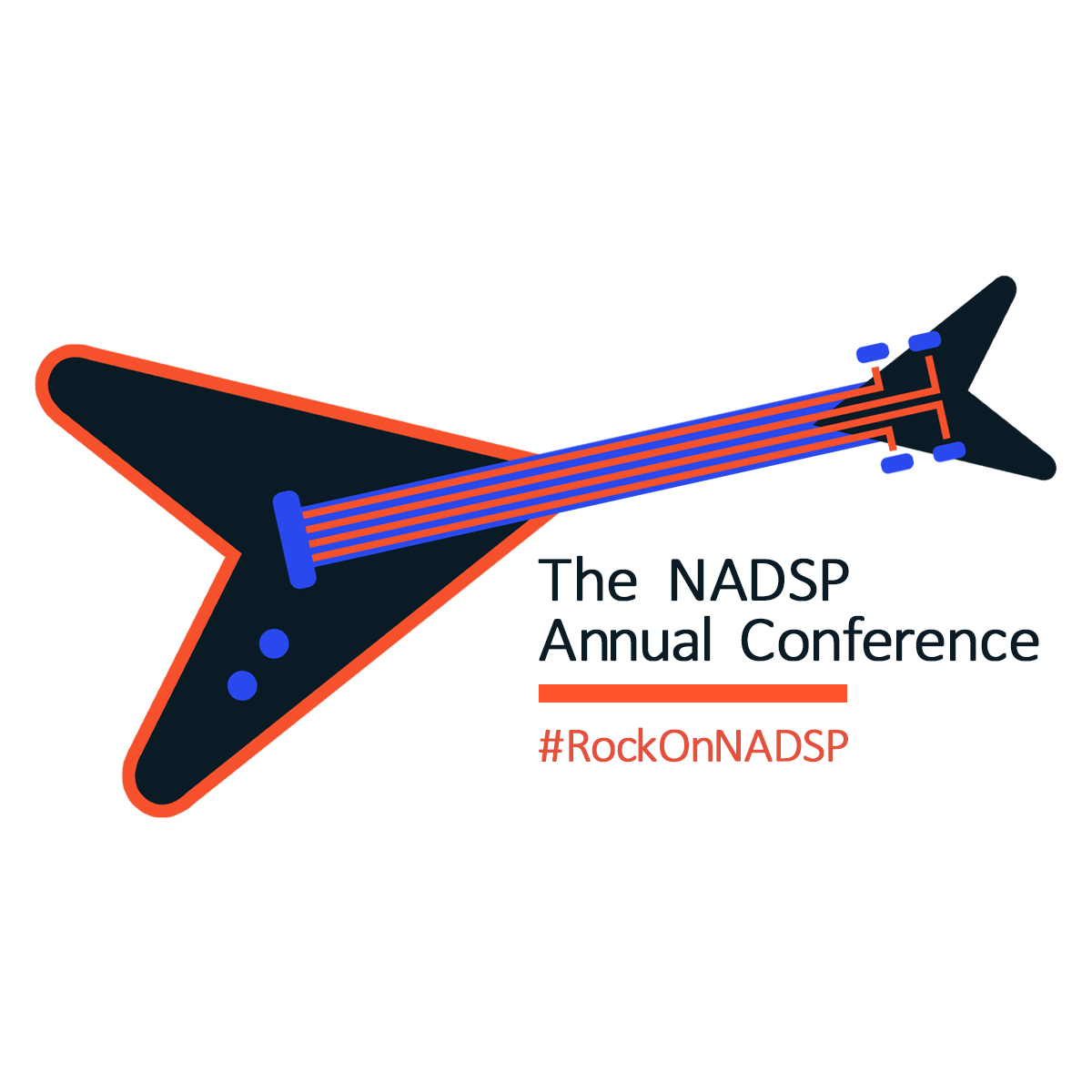The NADSP Annual Conference: The Fifth One
Detailed AgendaSeptember 6 & 7, 2019
Renaissance Cleveland Hotel
24 Public Square, Cleveland, OH 44113
Join in on all the fun, for The Fifth One! If you’re ready to #RockOnNADSP, don’t miss ‘The NADSP Annual Conference: The Fifth One’ on Friday, September 6th and Saturday, September 7th in Cleveland, Ohio - home of The Rock and Roll Hall of Fame. Our conference acts as the kickoff celebration for the 2019 Direct Support Recognition Week. At the conference, attendees will learn about best practices, share stories, network and gain insight to elevate the status of direct support professionals. We will also announce The John F Kennedy, Jr. Award for Direct Support Advocacy & Leadership at our cocktail hour reception.
2019 NADSP Annual Conference: The Fifth One Schedule

Friday, September 6, 2018 – Day One
8:00 AM – 9:00 AM Registration for Pre-Conference Opens
9:00 AM – 12:00 PM Direct Support Professional Leadership Summit: Pre-Conference Concurrent Sessions
*Must Register for the Pre-Conference Session to Attend*
Pre-Conference Public Policy Session A:
Advocating for Effective Public Policy Reform: It’s Time for Direct Support Professionals to Take the Lead
Speakers: Amy Hewitt, Institute on Community Integration at The University of Minnesota, Liz Weintraub, Association of University Centers on Disabilities (AUCD) and Robert Espinoza, Paraprofessional Healthcare Institute (PHI)
Description: The presenters will discuss the current challenges facing the direct support workforce. The session will focus on the use of public policy advocacy that uses interactive activities to engage attendees with new strategies and solutions to make change at home. Additionally, the session will offer insight into why Medicaid is critically important to the direct support workforce and why it is in peril. Presenters will offer personal stories about the need to understand how Medicaid policy is linked to direct support professional wages, career ladders and building a viable profession. Participants will leave with tangible and practical ways to effect public policy and begin to lead a movement from within the direct support workforce that finally addresses the critical shortage of qualified direct support workers
Pre-Conference Leadership Session B:
Building Leadership Skills in Direct Support Professionals
Speakers: Caitlin Bailey, The National Leadership Consortium on Developmental Disabilities at The University of Delaware, Kristen Loomis, The National Leadership Consortium on Developmental Disabilities at The University of Delaware Drew Smith, Community Bridges Consulting Group and Lynne Seagle, Hope House Foundation
Description: Learn how to build direct support leadership skills and abilities to your role and team. This session offers an opportunity to learn about your role as a leader, identify your leadership strengths and grow those strengths to look for more opportunities to lead. You will leave this session with a better understanding about what it means to be a direct support professional leader, a clearer sense of the leadership strengths that you bring to your role as a DSP, strategies that you can use to lead every day and real connections with a network of leaders from across the country
10:00 AM Full Conference Registration Opens
1:00 PM – 1:15 PM Welcome and Opening Remarks: Jeff Davis, Ohio Department of Developmental Disabilities, Joseph M. Macbeth, NADSP, Caitlin Bailey, The National Leadership Consortium on Developmental Disabilities at The University of Delaware
1:15 PM – 2:15 PM Plenary Session – The Happiness Code: The 5 Active Reflections of Really, Really Happy Professionals! Presented by Dr. Stephen Birchak
Description: In a changing world of stress and struggles, how can we stay positive when life is getting tough? How do we re-energize when tension seems to drain us? When the whole world is becoming more stressed, can organizations and individuals create a positive attitude change? “Dr. Bird” has spent nearly forty years as a college professor researching and teaching positive psychology and the effects of tension, stress, and change in our culture. He uses research, theory, humor, and reflection to explain and clarify the critical influences on happiness in our lives. He offers strategies and functional skills for dealing with toxic people, attitude change, and stressful situations. In this day and age of hostility and tension, we could all use a little more serenity and “Dr. Bird” leaves every audience with new essential skills and inspiration. The five active reflections not only changes lives, they often save them. “Dr. Bird” uses humor, reflection, and stories, to give all conference participants new insights they can take back and use long after the conference is over!
2:15 PM – 2:30 PM Break with Exhibitors
2:30 PM – 3:30 PM Breakout Series One
Session 1: “Friends or Friendly”: A Deep Dive into a Difficult Topic, presented by Rachel Jacob, Arc Mid-Hudson
Description: Given today’s easy access to social media and communication technology, many direct support professionals may consider themselves to be “friends” with the people they support. Is this the ultimate form of inclusion and person-centered practices? Or is this potentially unprofessional and unethical behavior? Come interact with others in a session that explores this highly controversial and complicated topic using guided debate and collaborative activities. Participants will leave the session able to answer to the difficult question: Can/should direct support professionals be friends with the people they support? Or better yet, can/should the people we support be our friends?
Session 2: Always Fresh. Always Relevant: How to Contribute in Frontline Initiative, Presented by Chet Tchetter and Julie Kramme, Institute on Community Integration at The University of Minnesota
Description: The Frontline Initiative has been the exclusive newsletter for direct support professionals for over twenty years. Each issue features articles written about topics that direct support professionals tell us are important to their professional development. During this session you’ll have a chance to learn more about Frontline Initiative and how you can contribute to quality direct support practice across the country. We want to hear from you! We want to know what topics and issues are at the front of your mind in your practice. What are the challenges or issues you face in your work? What do you want to learn? What do you want to know more about? How would you like to be involved? What can you share with other direct support professionals? What stories do you have to tell? Why is this work important to you? What resources or speakers should we contact to contribute to Frontline Initiative? Finally, we will share with you some easy steps for writing an article, a story, or to share a resource in Frontline Initiative. This session is your chance to share and interact!
Session 3: The Direct Support Professional Role in Helping People at the End of Life, Presented by Rick Rader, MD, The American Academy on Developmental Medicine and Dentistry (AADMD) and Orange Grove Center
Description: While the “P” in DSP defines us as “professionals,” the very nature of the work encourages a personal attachment to the individuals we support. The “relationship” is what is unique about our work. How does the direct support professional, (as a professional) successfully balance and navigate the “grief” that comes with the loss that will always be a part of human interaction? We explore the various types of grief, the grieving process, and the hope for personal growth that comes with this critically important journey.
Session 4: Morale: Lifting Up, Looking Up, and Moving Forward, Speaker TBA, Vita Community Living Services
Description: “Morale is self-esteem in action.” Feeling good about yourself, about the job that you do and about the agency that employees you reflects in everyday work performance. We know, instinctively, that when we get up to go somewhere to do work that’s important, work that is acknowledged and work that transforms live and we feel excited to get to it, our morale is shining through. Direct support professionals at Vita Community Living Services formed a committee where they and senior management could work out a plan to improve morale within the organization. This session will look at what they did and what they discovered. Participants in the session will learn ideas and strategies for improving morale and for engaging staff to discuss how they feel about the support they get and the resources they need.
3:30 PM – 3:45 PM Break with Exhibitors
3:45 PM – 4:45 PM Plenary Session – Documentary Premiere with Q&A
Invaluable: The Unrecognized Profession of Direct Support, Presented by Jerry Smith, The Institute on Community Integration at The University of Minnesota and a Panel of Leaders in Workforce Development
Description: Invaluable: The Unrecognized Profession of Direct Support, is a 45-minute documentary exploring the complex, underappreciated, and underfunded work of direct support professionals, the people who support individuals with intellectual and developmental disabilities in living full lives as participating members of their communities. The documentary will be followed by a Q&A discussion, lead by filmmaker Jerry Smith. Watch the trailer here.
4:45 PM – 6:00 PM John F. Kennedy Jr. Award for Direct Support Workforce Advocacy & Leadership Presentation and Cocktail Reception
6:00 PM Dinner on your own

Saturday September 7, 2018 – Day Two
8:00 AM – 8:45 AM Registration – The Frontline Initiative Breakfast
9:00 AM – 9:15 AM Welcome and Introductions – Joseph M. Macbeth and John Raffaele, NADSP
9:15 AM – 10:15 AM Plenary Session – Beyond Why and Beyond Wings, Presented by Dave Hingsburger, Vita Community Living Services
Description: Can someone else be your purpose? Can someone else be your mission? Can we in our need to serve objectify people with disabilities? Maybe providing human service is simply … well, can’t give that away here. Warning ‘Farting’ will indeed be discussed from the podium.
10:15 AM – 10:30 AM Break with Exhibitors
10:30 AM – 11:30 AM Breakout Series Two
Session 1: One Provider’s Credentialing Journey, Presented by Greg Miller, Penn-Mar Human Services and Dan Hermreck, NADSP
Description: Organizations are often challenged with designing credentialing programs for direct support professionals. The process of certifying/credentialing direct support professionals can be complex and daunting. This session will explore one organization’s journey in designing, implementing and evaluating a direct support professional credentialing program. Hear from the Executive Director of Penn-Mar Services about the journey he is currently taking as he leads a groundbreaking credentialing initiative within his agency.
Session 2: Overcoming Technology Fatigue: Thriving in the Fast Changing World of Direct Support Professionals, Presented by John Dickerson, Quillo and Dustin Wright, Disability Cocoon
Description: Learn about DSP Technology Fatigue – what it is, how it makes you feel, steps to understand why this is happening (choice or mandate?), what do you do about it that goes beyond surviving but flourishing and finding essential resources for you! This interactive session will explore the many changing technologies that are coming your way, how you make them work to make your life easier and actually thrive – rather than wear you down. Come prepared to share, learn and leave with tools that will help you when you get home.
Session 3: Direct Support Professionals & Disaster Preparedness and Response, Presented by Kristen Thompson, Community Options Inc.and Bob Irvine, California Vocations
Description: We all know the basics when it comes to disaster preparedness: do we have water, food, meds, etc., but what does it really look like? In this session we aim to facilitate an interactive discussion where all can share experiences of supporting people through natural disasters. From hurricanes to wildfires, the presenters will discuss what we did and what we wish we had done better to prepare, how we responded to the event and the long-term effects of the disasters.
Session 4: Removing Toxicity from the Workplace, Presented by Tony Thomas, Welcome House
Description: Many of us think about the residential and community living sites we work in as “family”. The people we support and staff make up one big happy family – we hear this and feel this all the time right?. And then there are those occasions when a new family member arrives (and new direct support professional recruit) and “all holy hell breaks loose. In this session we are going to explore three techniques that you can use to bring order to your “family” and your work environment and to find peace out of the chaos.
11:30 AM – 11:45 AM Break with Exhibitors
11:45 AM – 12:30 PM Plenary Session: Lessons Learned in Rural Psychiatry Telepsychiatry, Presented by Dr. Jana Dreyzehner, MD, Life Connect Health, LLC.
Description: Dr. Dreyzehner reflects on lessons learned along her journey from serving as a direct support professional in a Chicago group home for deaf adults with developmental disabilities to providing direct psychiatric services in rural Appalachia to founding a company to make team-based person-centered specialized behavioral health services accessible even in rural areas using telehealth.
12:30 PM – 1:30 PM Lunch
1:30 PM – 2:30 PM Breakout Series Three
Session 1: Shifting Your Perspectives from Direct Support Professional to Frontline Supervisor, Presented by Monica Robinson, New Horizons Resources
Description: Many outstanding direct support professionals are promoted into leadership positions without the proper training or understanding of the shift in their role from direct support professional to frontline supervisor. Many times, frontline supervisors continue doing the work of a direct support professional plus take on added responsibilities that come with the promotion. Their heart often stays connected to the role of a direct support professional and struggles to find a balance between managerial work and direct support. Becoming an effective frontline supervisor is not about finding balance between roles, it’s about shifting your perspective. As a direct support professional your role is to support the people receiving services. As a frontline supervisor it must shift to supporting the direct support professional. Learn how a shift in your perspective can help you become a more effective leader.
Session 2: The Alphabet Community: Who We Are and What We Need From You, Presented by Dave Hingsburger, Vita Community Living Services and Panel Members to Be Announced
Description: Most often when you see the, now familiar abbreviation, it’s presented with a small plus sign: LGBTQ+. That sign indicates that the community is larger and more diverse that it may, at first appear. LGBTTQQ2SIAAP is the present configuration of the ‘alphabet community,’ in Canada. Many people from outside the community have no idea what some of those letters mean. This session will do more than give a list of definitions, it will focus on both the depth and breadth of the community but also discuss the intersection between the LGBTTQQ2SIAAP community and people who have intellectual disabilities. Because we serve a fully human population and because we as humans experience a wide range of sexual and gender identities one can only expect that people with disabilities will too. This session will discuss how to support those who come out and how to create a safe environment for people to be who they are without fear. All of the presenters are proud members of the LGBTTQQ2SIAAP community and all work providing support to people with intellectual disabilities.
JUST ADDED Session 3: Emerging from the Shadows: Telling Stories of Inclusion, Support and Empowerment, Presented by Sean Luechtefeld, ANCOR
As a Direct Support Professional, you know the importance of leading from behind. Taking a step back so the individuals you support can sound their own voices and claim their own successes is second nature to you. But what happens when DSPs become invisible to the outside world in their quest to help individuals shine? How can society see—and thus make the case for deeper investments in—the critical roles DSPs play in facilitating the successes of the individuals they support? One way is by telling your own story of what it means to include, support and empower individuals with disabilities, but how do you even start to put into words the nature of your work? In this interactive session, participants will glean concrete strategies for stepping out of the shadows and into the spotlight to tell their own stories so everyone can see, appreciate and invest in the ways in which DSPs strengthen our communities.
Session 4: Alternatives to Addressing the Workforce Crisis through Secondary Education and Industry Credentialing, Presented by Bethany Toledo, Ohio Alliance of Direct Support Professionals (OADSP), Becky Sharp, Columbus Center for Human Services (CCHS), Kelsey Goodman, CCHS and Amy Schakat, Southwestern City Schools
Description: In this session, participants will learn about the Community Connections Career Partnership – Ohio program. This program C3P(O) exposes high school juniors and seniors to the field of direct support through a combined curriculum and internship program that creates an alternative pathway to high school graduation. This unique program was created through a partnership between the Ohio Alliance of Direct Support Professionals (OADSP) and the Ohio Provider Resource Association (OPRA). This session will provide an overview of the fundamental elements necessary to make a program of this nature successful, and highlight the various partnerships between local schools, organizations, providers, and other stakeholders.
2:30 PM – 2:45 PM Break with Exhibitors
2:45 PM – 3:30 PM Networking and Guided Group Discussions, Presented by Caitlin Bailey and Kristen Loomis, The Leadership Consortium on Developmental Disabilities at The University of Delaware.
Description: We want to hear from you! Our large group will work at their tables in facilitated discussions that will focus on what direct support professionals need, experience and expect from their practice. The session provides a unique opportunity to learn and share with colleagues from across the country in a unique networking session. We will collect the information that you share for future research purposes, articles and/or policy initiatives.
3:30 PM – 4:30 PM Plenary Session: Metamorphosis: From Adversity to Leadership, Presented by Omayra Andino, The Institutes of Applied Human Dynamics (IAHD)
Description: In our final session, you’ll experience the heartfelt journey of one woman’s quest to find her way through childhood adversity, filled with tragedy and loss, to a career in human services leadership. Ms. Andino will share the lessons she’s learned along the way with the hopes of inspiring others to reach for their dreams despite life’s challenges. You’ll share moments of tears & laughter and leave the conference ready to face whatever life throws your way.
Questions?
For any questions or conference inquiries, reach out to Nicole Dama at ndama@nadsp.org or at 518-795-3505. Visit the conference main page here.

